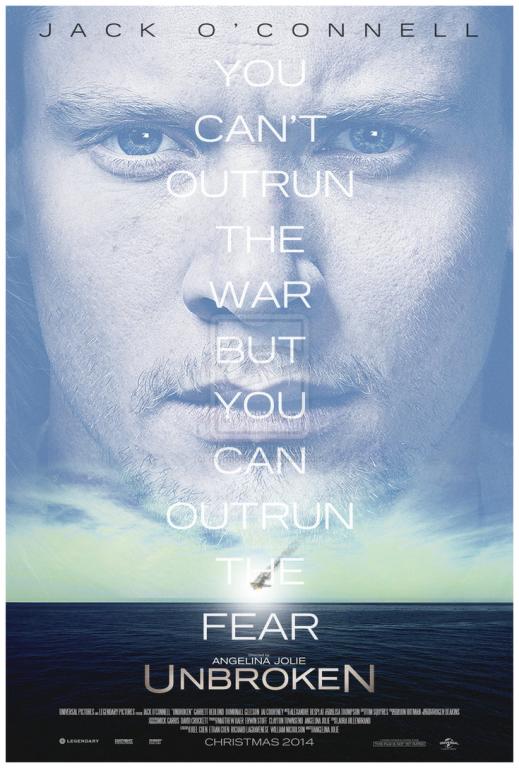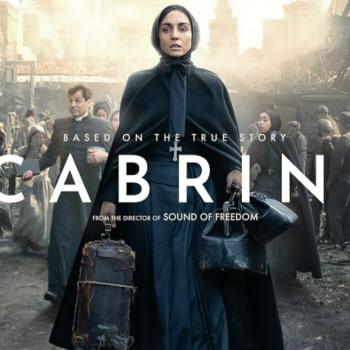A crew of young Army Air Force aviators is in the thick of a battle over the Pacific in April 1943. Young Louis “Louie” Zamperini (Jack O’Connell) is a bombardier and the plane takes on heavy fire by the Japanese and some of the men are injured. They barely make it back to base in Hawaii in tact. A month later the crew is given a patched up plane and sent on a search mission. The plane’s engines fail and it crashes into the Pacific Ocean. Only Zamperini, the pilot “Phil” Phillips (Domhnall Gleeson) and “Mac” McNamera (Finn Wittrock) survive.
The men float with the currents for 47 days. They endure weather, suffer from exposure to the sun, shark assaults and an attack by a Japanese plane. They eat by catching fish and albatrosses. Mac dies on their 33rd day at sea. At their lowest point, Louie promises God that if he comes through this, he will do God’s will. The Japanese capture Louie and Mac when they reach the Marshall Islands.
As prisoners of war, the men are held in isolation and tortured. The guard in charge of the prisoners is named Mutsuhiro Watanabe (Takamasa Ishihara.) The men have nicknamed “The Bird” so they can talk about him without fearing reprisal. When The Bird discovers that Louie was an Olympic runner who competed at the 1936 Olympics in Berlin, he begins to torment and humiliate Louie in every way he can. Watanabe’s sadistic cruelty is rooted in his disappointment at not being made an officer and Louie is made to pay.
When Watanabe is transferred to another camp, Louie breathes a little easier. But then he and the other prisoners are sent to a work camp now headed by The Bird. He inflicts unrelenting and terrible suffering on Louie who keeps on telling himself something his brother Pete (Alex Russell) would say as he coached Louie when he ran track, “If you can take it, you can make it.”
Louie distracts the other POWs by describing his mother’s Italian cooking and sometimes these brave men talk about faith.
“Unbroken” is based on author Laura Hillenbrand’s compelling 2010 bestseller about the life of Louis Zamperini Unbroken: A World War II Story of Survival, Resilience, and Redemption. The book is a thorough biography that goes well beyond the epic scope of the film. As Luke Zamperini, Louie’s son, told me in an interview, the story would need eight or nine hours to tell Louie’s whole story, rather than the 137 minutes that has made it to theaters for a Christmas day opening.
Angelina Jolie directs “Unbroken” with care, aiming for a PG-13 rating that will allow teens to see the film. This basically means that there is no offensive language and while the beatings are intense and savage, we don’t see any blood flowing (flowing blood merits an “R” rating.) She also gently integrates the faith element, something she promised Louie when the film went into production. Louie was hospitalized in June this year and he saw the film on Jolie’s laptop computer before he died on July 2 at the age of 97. He said that he liked the film – but his son Luke said Louie liked Angelina’s visits even more!
While Zamperini’s story is inspiring, whether you read the book and/or see the film, the movie does suffer from combat fatigue and torture overload. The writing team includes Oscar winners Joel and Ethan Coen (known for “Old Country for Old Men”; “Fargo”), and Oscar nominees Richard Gravenese (“The Horse Whisperer”; “Freedom Writers)” and William Nicholson (“Les Miserables”; “Gladiator”) and I wonder if this is not part of the problem: too many writers, even great writers, spoil the soup. I was rightly horrified by the torture scenes and what Louie and the men suffer. But then all we get at the end are a few paragraphs of text about what happens after the events in the film – a skimpy description what I feel is the most inspiring parts of Louie’s story.
“Unbroken” is a good film and it is inspiring, though uneven. Some may judge it as great but I won’t go that far. The cinematography is exceptional and the acting is believable, as is the historic staging. I would have compressed the combat sequences and even the torture scenes, so that the third act could have covered a few years of Louie’s post-war story. How he lived after the torture of the war, which never defined him, is the part that inspires me, touches my heart, and always moves me deeply.
The film reminds us, too, why torture is inhuman, a good lesson as we discuss our country’s use of torture in recent years.













